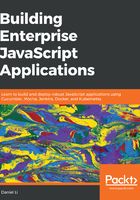
上QQ阅读APP看书,第一时间看更新
What this book covers
Unlike online blogs and websites, physical books have a page limit. Consequently, we had to be rigorous in our choice of tools to include. In the end, we hand-selected tools and frameworks based on two criteria:
- It must be commonly encountered in an enterprise environment.
- It must have a high likelihood of remaining relevant for a long time (no hype-driven development!).
This narrowed down the list to these tools—Git, npm, yarn, Babel, ESLint, Cucumber, Mocha, Istanbul/NYC, Selenium, OpenAPI/Swagger, Express, Elasticsearch, React, Redux, Webpack, Travis, Jenkins, NGINX, Linux, PM2, Docker, and Kubernetes. We will utilize these tools to build a simple, but robust, user directory application that consists of a backend API and a frontend web user interface (UI).
This book is divided into five sections:
- Chapters 1 to 3 – Overview of theories and practices that provide the context for the rest of the book
- Chapters 4 to 13 – Developing a backend API
- Chapters 14 to 16 – Developing a frontend web application that links up with the API
- Chapters 17 to 18 – Deploying our services on a scalable infrastructure using Docker and Kubernetes
- Chapters 19 to 20 – Explaining important JavaScript concepts and syntax